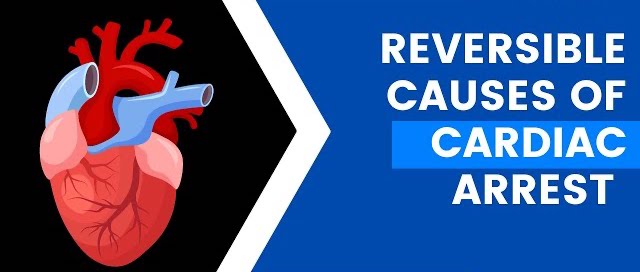
I
Potential Causes of Cardiac Arrest: The 4 H’s and 4 T’s
The 4 H’s
- Hypoxia:
- Description: Lack of oxygen in the blood.
- Causes: Respiratory failure, airway obstruction, low oxygen levels in the environment, carbon monoxide (CO) poisoning, high altitude.
- Management: Ensure adequate ventilation and oxygenation, address the underlying cause, use hyperbaric oxygen therapy for CO poisoning.
2. Hypovolemia:
- Description: Low blood volume.
- Causes: Severe dehydration, haemorrhage, excessive fluid loss, severe burns, gastrointestinal losses (vomiting, diarrhoea).
- Management: Rapid volume replacement with intravenous fluids or blood products, manage the underlying cause of fluid loss.
3. Hypothermia/Hyperthermia
- Description: Abnormally low body temperature.
- Causes: Prolonged exposure to cold environments, submersion in cold water.
- Management: Gradual rewarming using blankets, warm IV fluids, and other warming techniques.
4. Hypo-/Hyperkalemia and Other Metabolic Disturbances (Hydrogen Ions H+ pH):
- Description: Abnormal levels of potassium or other significant electrolyte/metabolic imbalances, including hypoglycemia.
- Causes: Renal failure, excessive potassium intake, severe vomiting or diarrhoea, untreated diabetes.
- Management: Correct the electrolyte imbalance (e.g., calcium chloride, insulin with glucose, and sodium bicarbonate for hyperkalemia; cautious potassium administration for hypokalemia). Administer glucose for hypoglycemia.
The 4 T’s
- Tension Pneumothorax:
- Description: Accumulation of air in the pleural space under pressure, compressing the lungs and heart.
- Causes: Chest trauma, mechanical ventilation, underlying lung disease.
- Management: Immediate needle decompression followed by chest tube insertion.
2. Tamponade (Cardiac):
- Description: Accumulation of fluid in the pericardium, leading to reduced cardiac output.
- Causes: Trauma, pericarditis, myocardial infarction, malignancy.
- Management: Pericardiocentesis to remove the fluid.
3. Toxins (Drug Overdose):
- Description: Poisoning by drugs or other substances.
- Causes: Overdose of medications, recreational drugs, exposure to toxic substances.
- Management: Administer appropriate antidotes, supportive care, consider activated charcoal if appropriate, and perform decontamination if needed.
4. Thrombosis (Pulmonary or Coronary):
- Description: Blood clot blocking major vessels.
- Pulmonary Thrombosis: Blockage of the pulmonary arteries (pulmonary embolism).
- Causes: Deep vein thrombosis (DVT) traveling to the lungs.
- Management: Anticoagulation, thrombolysis, or surgical embolectomy.
- Coronary Thrombosis: Blockage of the coronary arteries (acute myocardial infarction).
- Causes: Atherosclerosis, plaque rupture.
- Management: Percutaneous coronary intervention (PCI), thrombolytics, antiplatelet therapy.
